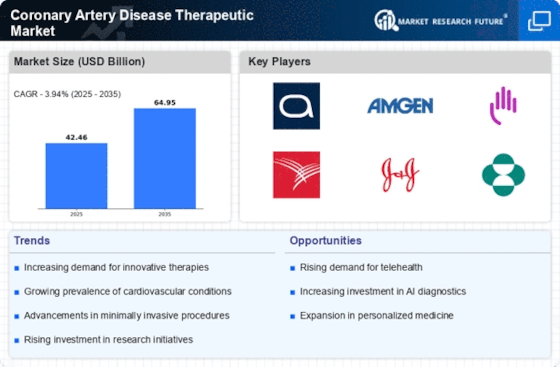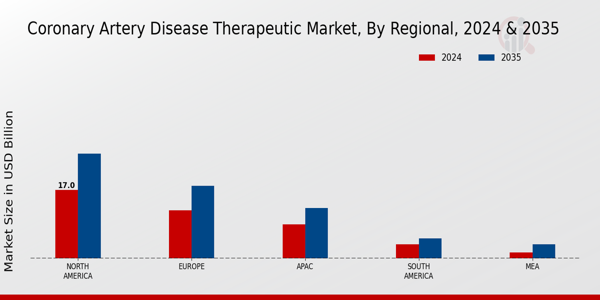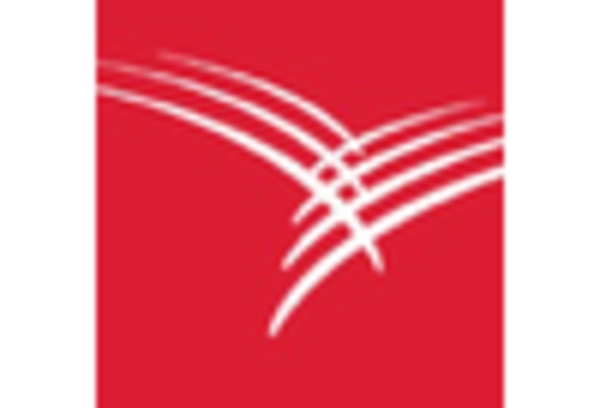Advancements in Medical Technology
Technological innovations in the field of cardiology are significantly influencing the Coronary Artery Disease Therapeutic Market. The development of advanced diagnostic tools, such as high-resolution imaging and minimally invasive surgical techniques, enhances the ability to detect and treat CAD at earlier stages. Moreover, the introduction of novel drug delivery systems and bioengineered stents has improved patient outcomes and reduced recovery times. Market data indicates that the adoption of these technologies is expected to grow, as healthcare systems increasingly prioritize efficiency and effectiveness in treatment protocols. This technological evolution not only facilitates better management of CAD but also encourages pharmaceutical companies to invest in research and development, further driving market growth.
Government Initiatives and Funding
Government initiatives aimed at combating cardiovascular diseases are playing a crucial role in shaping the Coronary Artery Disease Therapeutic Market. Various health authorities are implementing policies that promote research, development, and accessibility of CAD treatments. Funding for clinical trials and public health programs is on the rise, which supports the introduction of innovative therapies and enhances patient access to care. Additionally, regulatory bodies are increasingly approving new drugs and treatment modalities, which further stimulates market growth. The collaboration between public and private sectors in addressing CAD is likely to yield positive outcomes, ensuring that effective therapeutic options are available to a broader population.
Rising Awareness and Education Initiatives
Increased awareness regarding heart health and the importance of early intervention is a significant factor propelling the Coronary Artery Disease Therapeutic Market. Public health campaigns and educational programs aimed at promoting heart-healthy lifestyles have led to a more informed population. As individuals become more cognizant of the risk factors associated with CAD, they are more likely to seek medical advice and treatment. This shift in patient behavior is reflected in market trends, where there is a noticeable increase in the demand for preventive therapies and lifestyle modification programs. Consequently, healthcare providers are adapting their strategies to meet this demand, thereby fostering growth within the therapeutic market.
Increasing Prevalence of Coronary Artery Disease
The rising incidence of coronary artery disease (CAD) is a primary driver for the Coronary Artery Disease Therapeutic Market. As lifestyle-related factors such as obesity, sedentary behavior, and unhealthy diets become more prevalent, the number of individuals diagnosed with CAD continues to grow. According to recent statistics, CAD accounts for a substantial percentage of cardiovascular diseases, leading to increased healthcare costs and a heightened demand for effective therapeutic solutions. This trend is likely to propel the market forward, as healthcare providers seek innovative treatments to manage and mitigate the effects of CAD. Furthermore, the aging population, which is more susceptible to heart diseases, contributes to the expanding patient pool, thereby creating a robust market environment for therapeutic interventions.
Growing Demand for Preventive Healthcare Solutions
The shift towards preventive healthcare is becoming increasingly evident within the Coronary Artery Disease Therapeutic Market. As healthcare systems recognize the importance of preventing CAD rather than solely treating it, there is a growing emphasis on early detection and lifestyle interventions. This trend is supported by market data indicating that preventive measures, such as cholesterol-lowering medications and lifestyle modification programs, are gaining traction among healthcare providers and patients alike. The focus on prevention not only reduces the burden of CAD on healthcare systems but also encourages pharmaceutical companies to develop innovative solutions that cater to this demand. As a result, the market is likely to experience sustained growth driven by the increasing prioritization of preventive healthcare.


















Leave a Comment